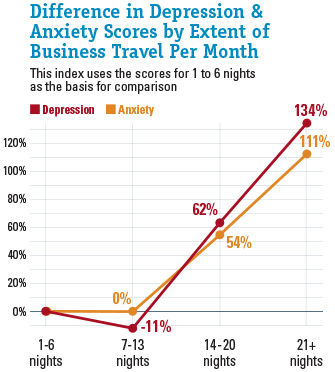Research by my colleagues and me over the past several years shows that physical, behavioral and mental health issues cluster among employees who travel extensively for work. The health issues that appear in concentrated amounts among this group include:
• obesity
• poor self-rated health
• depression
• anxiety
• smoking
• lack of physical activity
• alcohol dependence
• sleep issues
A World Bank study of medical claims made by its staff and consultants revealed similar findings.
We interpret this clustering of poor health to be the result of the chronic stress and wear and tear caused by frequent business travel. In the de-identified medical records we studied, only about 12 percent of business travelers were away from home for 14 or more nights per month, the cut point we use to define extensive travel. It is this group of employees, though, that is the face of a company to clients, customers and suppliers and at conferences.

In the U.S., travel is an important component of business activity; the Global Business Travel Association and American Express Global Business Travel report that U.S. travelers took more than 500 million domestic business trips in 2016 and were responsible for about 3 percent, or $547 billion, of U.S. GDP in 2016. The potential health costs related to business travel—higher medical claims, reduced employee productivity and performance, employee turnover, absenteeism, presenteeism and short-term disability—are starting to register on employers’ radars. The International Well Building Institute certifies that commercial buildings are designed to promote health and that the tenants have workplace policies that promote health. The Mind section of IWBI’s Well Building Standard includes workplace policy for promoting healthy business travel, and at its annual meeting this year, the Society for Collegiate Travel and Expense Management will host a panel discussion on the business travel experience and health.
What Companies Can Do
I view healthy business travel as a shared responsibility between the employee and the employer. Educate employees that business travel predisposes them to making decisions that, when repeated over the long run, can negatively affect their health. Run education programs around healthy eating in restaurants and on the go. Let travelers know, for instance, that restaurant food contains more calories per serving, is higher in total fat and saturated fat per calorie and contains less dietary fiber than meals prepared at home. Employers also can reimburse travelers for subscriptions for mobile apps that track diet and those that provide workout routines for settings with limited space or equipment, i.e., hotel rooms.
Education and mobile apps can empower employees, but these interventions are useful only if the employee responds to them. Employers can further support a culture of health by adopting policies that mitigate the wear and tear of business travel and by providing their travelers with tools and training for handling stress while on the road.
To that end, ensure that accommodations have gyms or reimburse employees for memberships to gyms that have national presences. Support physical activity and exercise to reduce both the risk of weight gain and symptoms of anxiety and depression. The IWBI standard for business travel policies includes gym access for travelers and provides additional recommendations.
In addition, expand your company’s health and wellness program to include stress management tools. Low-cost and relatively short training in mindfulness-based stress reduction has been shown to be useful for treating anxiety and depression and improving sleep. Research also suggests that mindfulness-based stress reduction can be used to prevent unhealthy eating.